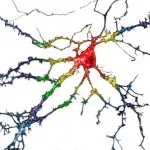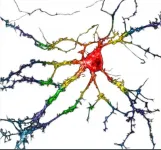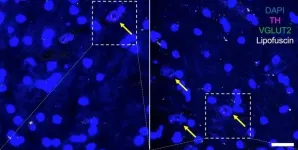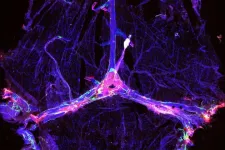Researchers identify a psychedelic-like drug without the hallucinogenic side effects
2021-04-28
(Press-News.org) Psychedelic drugs have shown promise for treating neuropsychiatric disorders such as depression and posttraumatic stress disorder. However, due to their hallucinatory side effects, some researchers are trying to identify drugs that could offer the benefits of psychedelics without causing hallucinations. In the journal Cell on April 28, researchers report they have identified one such drug through the development of a genetically encoded fluorescent sensor--called psychLight--that can screen for hallucinogenic potential by indicating when a compound activates the serotonin 2A receptor.
"Serotonin reuptake inhibitors have long been used for treating depression, but we don't know much about their mechanism. It's like a black box," says senior author Lin Tian (@LinTianLab), an associate professor in the Department of Biochemistry and Molecular Medicine in the School of Medicine at the University of California, Davis. "This sensor allows us to image serotonin dynamics in real time when animals learn or are stressed and visualize the interaction between the compound of interest and the receptor in real time."
Tian's lab joined forces with the lab of David E. Olson, an assistant professor in the Department of Chemistry at UC Davis, whose lab is focused on drug discovery. "This paper was an exceptionally collaborative effort," says Olson, a co-author on the study. "My lab is really interested in the serotonin 2A receptor, which is the target of both psychedelic drugs and classic antipsychotics. Lin's lab is a leader in developing sensors for neuromodulators like serotonin. It just made perfect sense for us to tackle this problem together."
Experts believe that one of the benefits of using psychedelic drugs over existing drugs is that they appear to promote neural plasticity--essentially allowing the brain to rewire itself. If proven effective, this approach could lead to a drug that works in a single dose or a small number of doses, rather than having to be taken indefinitely. But one thing that researchers don't know is whether patients would be able to gain the full benefit of neural plasticity without undergoing the "psychedelic trip" part of the treatment.
In the paper, the investigators report that they used psychLight to identify a compound called AAZ-A-154, a previously unstudied molecule that has the potential to act on beneficial pathways in the brain without hallucinogenic effects. "One of the problems with psychedelic therapies is that they require close guidance and supervision from a medical team," Olson says. "A drug that doesn't cause hallucinations could be taken at home."
The serotonin 2A receptor, also known as 5-HT2AR, belongs to a class of receptors called G protein-coupled receptors (GPCRs). "More than one-third of all FDA-approved drugs target GPCRs, so this sensor technology has broad implications for drug development," Tian says. "The special funding mechanisms of BRAIN Initiative from the National Institutes of Health allowed us to take a risky and radical approach to developing this technology, which could open the door to discovering better drugs without side effects and studying neurochemical signaling in the brain."
INFORMATION:
This work was supported by the National Institutes of Health, a Hellman Fellowship, and UC Davis STAIR and STAIR Plus grants. Olson is the president and chief scientific officer of Delix Therapeutics, Inc., which is developing AAZ-A-154. Tian is a co-founder of Seven Biosciences, which is developing a GPCR-based imaging platform. That company was founded by Grace Mizuno, a previous graduate student in the lab.
Cell, Dong et al.: "Psychedelic-inspired drug discovery using an engineered biosensor" https://www.cell.com/cell/fulltext/S0092-8674(21)00374-3
Cell (@CellCellPress), the flagship journal of Cell Press, is a bimonthly journal that publishes findings of unusual significance in any area of experimental biology, including but not limited to cell biology, molecular biology, neuroscience, immunology, virology and microbiology, cancer, human genetics, systems biology, signaling, and disease mechanisms and therapeutics. Visit: http://www.cell.com/cell. To receive Cell Press media alerts, contact press@cell.com.
[Attachments] See images for this press release:

ELSE PRESS RELEASES FROM THIS DATE:
2021-04-28
A genetically encoded sensor to detect hallucinogenic compounds has been developed by researchers at the University of California, Davis. Named psychLight, the sensor could be used in discovering new treatments for mental illness, in neuroscience research and to detect drugs of abuse. The work is published April 28 in the journal Cell.
Compounds related to psychedelic drugs such as LSD and dimethyltryptamine (DMT) show great promise for treating disorders such as depression, post-traumatic stress disorder, and substance use disorder. These drugs are called psychoplastogens ...
2021-04-28
It's one of the most audacious projects in biology today - reading the entire genome of every bird, mammal, lizard, fish, and all other creatures with backbones.
And now comes the first major payoff from the Vertebrate Genome Project (VGP): near complete, high-quality genomes of 25 species, Howard Hughes Medical Institute (HHMI) Investigator Erich Jarvis with scores of coauthors report April 28, 2021, in the journal Nature. These species include the greater horseshoe bat, the Canada lynx, the platypus, and the kākāp? parrot - one of the first high-quality ...
2021-04-28
Researchers have big ideas for the potential of quantum technology, from unhackable networks to earthquake sensors. But all these things depend on a major technological feat: being able to build and control systems of quantum particles, which are among the smallest objects in the universe.
That goal is now a step closer with the publication of a new method by University of Chicago scientists. Published April 28 in Nature, the paper shows how to bring multiple molecules at once into a single quantum state--one of the most important goals in quantum physics.
"People have been trying to do this for decades, so we're very excited," said senior author Cheng Chin, a professor of physics at UChicago who said he has wanted ...
2021-04-28
PITTSBURGH, April 28, 2021 - It is not every day that scientists come across a phenomenon so fundamental that it is observed across fruit flies, rodents and humans.
In a paper published today in Aging Cell, neuroscientists from the University of Pittsburgh Schools of the Health Sciences discovered that a single protein--a glutamate transporter on the membrane of vesicles that carry dopamine in neurons--is key to regulating sex differences in the brain's vulnerability to age-related neuron loss.
The protein--named VGLUT--was more abundant in dopamine neurons of female fruit flies, rodents and human beings than in males, correlating with females' greater resilience to age-related neuron loss and mobility deficiencies, the researchers found. Excitingly, ...
2021-04-28
DURHAM, N.C. -- A multidecade study of young adults living in the United Kingdom has found higher rates of mental illness symptoms among those exposed to higher levels of traffic-related air pollutants, particularly nitrogen oxides, during childhood and adolescence.
Previous studies have identified a link between air pollution and the risk of specific mental disorders, including depression and anxiety, but this study looked at changes in mental health that span all forms of disorder and psychological distress associated with exposure to traffic-related air pollutants.
The findings, which will appear April ...
2021-04-28
Experimental Alzheimer's drugs have shown little success in slowing declines in memory and thinking, leaving scientists searching for explanations. But new research in mice has shown that some investigational Alzheimer's therapies are more effective when paired with a treatment geared toward improving drainage of fluid -- and debris -- from the brain, according to a study led by researchers at Washington University School of Medicine in St. Louis.
The findings, published April 28 in the journal Nature, suggest that the brain's drainage system -- known as the meningeal lymphatics -- plays a pivotal but underappreciated role in neurodegenerative disease, and that repairing faulty drains could be a key to unlocking the potential of certain Alzheimer's therapies.
"The ...
2021-04-28
Is forest harvesting increasing in Europe? Yes, but not as much as reported last July in a controversial study published in Nature.
The study Abrupt increase in harvested forest area over Europe after 2015, used satellite data to assess forest cover and claimed an abrupt increase of 69% in the harvested forest in Europe from 2016. The authors, from the European Commission's Joint Research Centre (JRC), suggested that this increase resulted from expanding wood markets encouraged by EU bioeconomy and bioenergy policies. The publication triggered a heated debate, both scientific ...
2021-04-28
What The Study Did: Length, readability and complexity of informed consent documents for the COVID-19 vaccine phase III randomized clinical trials were assessed in this quality improvement study.
Authors: Ezekiel J. Emanuel, M.D., Ph.D., of the University of Pennsylvania in Philadelphia, is the corresponding author.
To access the embargoed study: Visit our For The Media website at this link https://media.jamanetwork.com/
(doi:10.1001/jamanetworkopen.2021.10843)
Editor's Note: The article includes conflict of interest and funding/support disclosures. Please see the article for additional information, including other authors, author ...
2021-04-28
What The Study Did: The number of applicants and number of applications submitted per applicant to internal medicine residency and subspecialty fellowships for 2021 during the COVID-19 pandemic were compared with five prior application cycles in this study.
Authors: Laura A. Huppert, M.D., of the University of California, San Francisco, is the corresponding author.
To access the embargoed study: Visit our For The Media website at this link https://media.jamanetwork.com/
(doi:10.1001/jamanetworkopen.2021.8199)
Editor's Note: The article includes ...
2021-04-28
What The Study Did: Researchers evaluated racial/ethnic differences in the performance of statistical models that use health record data to predict the risk of suicide after an outpatient mental health visit.
Authors: R. Yates Coley, Ph.D., of the Kaiser Permanente Washington Health Research Institute in Seattle, is the corresponding author.
To access the embargoed study: Visit our For The Media website at this link https://media.jamanetwork.com/
(10.1001/jamapsychiatry.2021.0493)
Editor's Note: The article includes conflict of interest and funding/support disclosures. Please see the article for additional information, including other authors, author contributions and affiliations, conflict of interest ...
LAST 30 PRESS RELEASES:
[Press-News.org] Researchers identify a psychedelic-like drug without the hallucinogenic side effects




